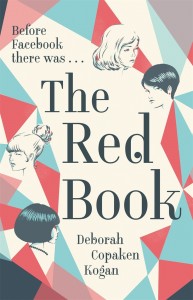 Published by Virago 6 September 2012
Published by Virago 6 September 2012
368pp, hardback, £14.99
Reviewed by Charlotte Moore
Four Harvard roommates, Clover, Addison, Mia and Jane, have stayed friends since graduating in 1989.This novel assembles them for a college reunion, twenty years on. It’s not exactly an original premise for fiction, but Deborah Copaken Kogan gives the format a fresh topdressing through the ‘Red Book’, a five-yearly class report in which alumni list personal details and give a resume of their lives. The tone of the Red Book is generally sprightly, facetious, humourously self-deprecating, but what dark feelings, what frustrated ambitions and thwarted desires, do these bland entries mask?
The Red Book entries for the four heroines and for many other characters are given in full. This is a strong framing device, and the reader can refer back to check the facts on a particular character. That is, if the reader wants to. The problem is that reading the reports is like reading round-robin Christmas letters. I find that I only want to read round-robins once, if at all, and they come from real people, people I know. Details of spouses, house moves, children’s achievements, hobbies… Copaken Kogan, it seems, feels duty bound to answer, at some length, questions the reader never wanted to ask.
Despite (or perhaps because of) all this information, it’s surprisingly hard to tell the characters apart. Addison, the would-be artist with the useless husband and the inflated sense of entitlement; Mia, the born actress who gave it all up to raise her children; Clover, the mixed-race beauty who shook off her free-wheeling hippy childhood to become a managing director of Lehman Brothers – they all seem to speak with the same voice. Only Jane stands out. An adopted Vietnamese orphan dealing with fresh bereavement since her war-photographer husband was ambushed inAfghanistan, she is a little more distinctive and vivid.
The alumni congregate for the reunion with their partners and offspring, and Copaken Kogan throws as much melodrama into the weekend as the reader can take. I don’t want to give away the stories, because there is a page-turning momentum, even though it’s frequently stalled by those dratted Red Book entries. Suffice it to say that this reunion weekend makes Eastenders look like a model of Beckettian restraint.
Once you get past the turgid scene-setting, it’s quite lively, though I was never sure what was meant to be funny. I enjoyed the carefully-engineered progeny of the oh-so-civilized lesbian couple, eschewing the corrupting charms of junk food and internet in favour of making sensitive charcoal sketches in the shade of a tree. But when Mia, Clover et al go out partying, leaving the little ones, including a baby, in the care of the older children, they return to find seventeen-year-old Max deflowering fourteen-year-old Trilby while the twelve-year-olds watch hardcore porn on line, the baby dangerously neglected. ‘You’re applying to college this year! You can’t afford to screw up like this!’ expostulates Max’s mother, while the father of the pornwatchers is primarily concerned that they have consumed a whole box of Oreos: ‘Trans fats will kill you.’ Is this a satire on the priorities of the high-achieving classes in early twenty-first-centuryAmerica, or is it an endorsement of those priorities?
Deborah Copaken Kogan wants to deal with everything – post-feminism, the recession, the new technology. She sets out to provide a ‘way we live now’ novel, a grand, detailed portrait of youthful aspirations confronting the onset of middle age and a tidal wave of social change. There are moments of insight, but there’s also a slick silliness (not to mention endless product placement) that makes it difficult to take the characters and their problems seriously. Addison is arrested for unpaid traffic fines. No problem; her ex-lover (female) writes a bail cheque for 100,000 dollars. Isn’t that what friends are for? Clover, adrift in the woeful job market after the collapse of Lehmans, wonders how her lifestyle can be maintained. Her suffering is shortlived; she ditches her unresponsive and infertile husband and sails off into the sunset with Bucky, the old college beau who has obligingly, if unwittingly, impregnated her in the torrid atmosphere of the reunion weekend. I mean the sunset bit literally; they whizz off to the Bahamas and start a successful, recession-proof business there.
These four women are supposed to be intimate friends, but they have few conversations with one another, and those they do have are not interesting. The Red Book bounces along enjoyably enough, but it makes promises that it doesn’t deliver.
